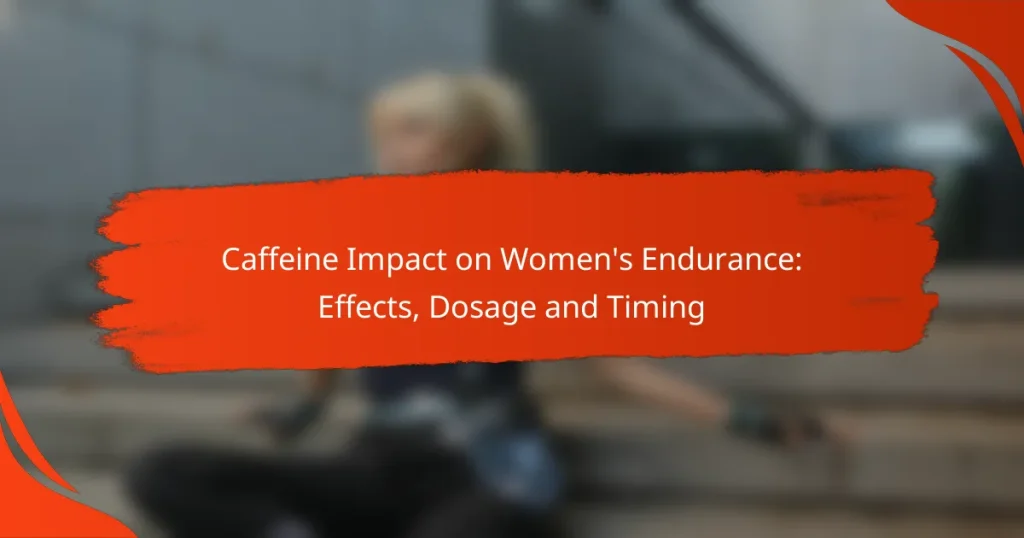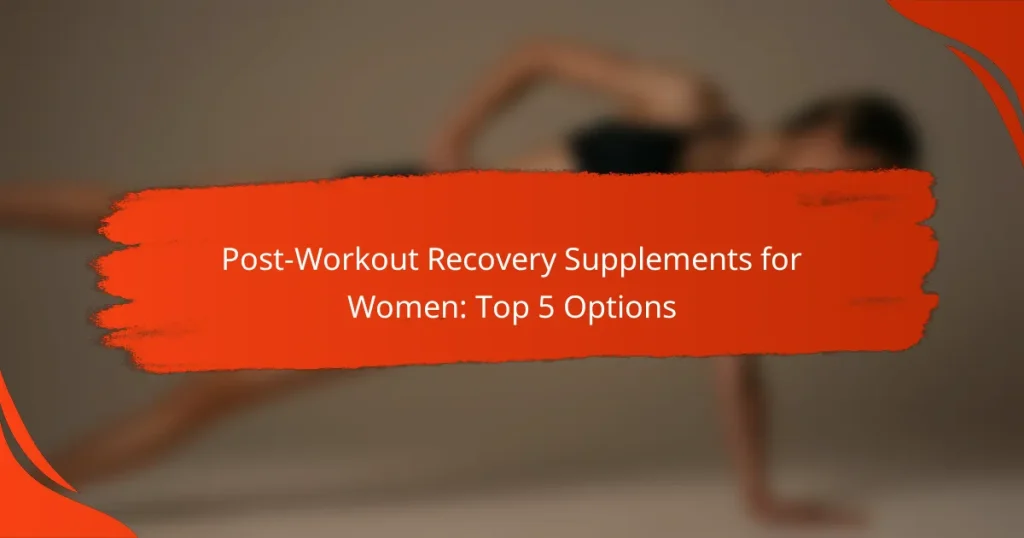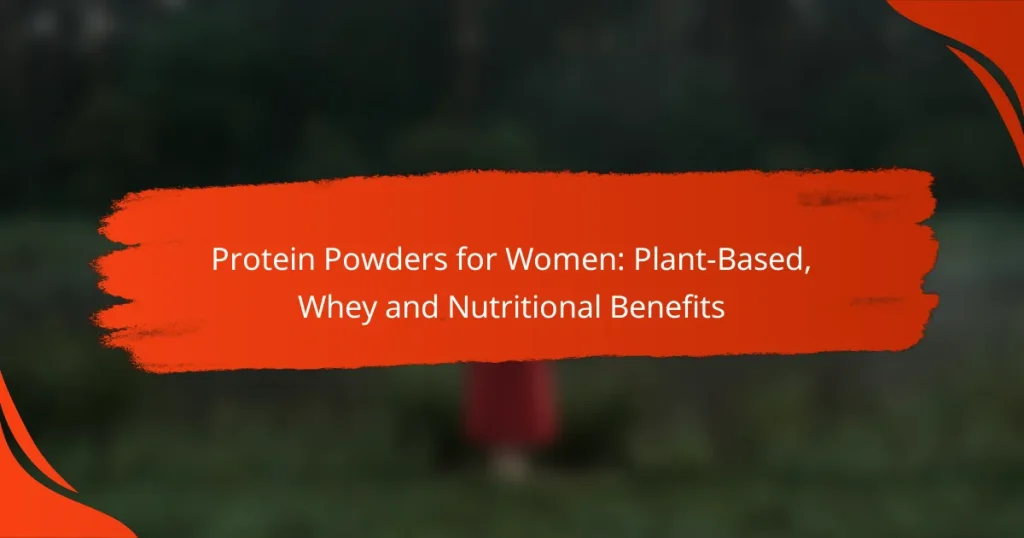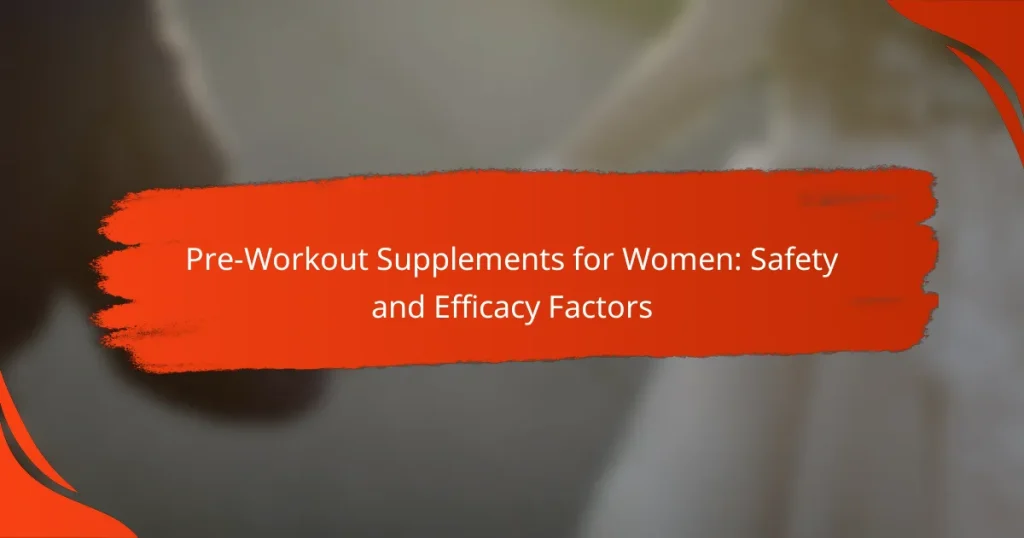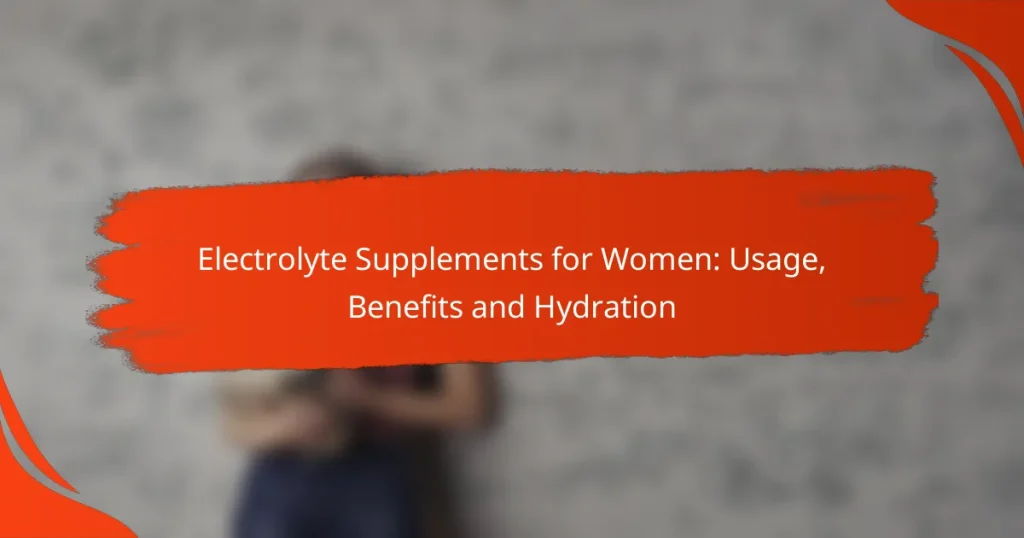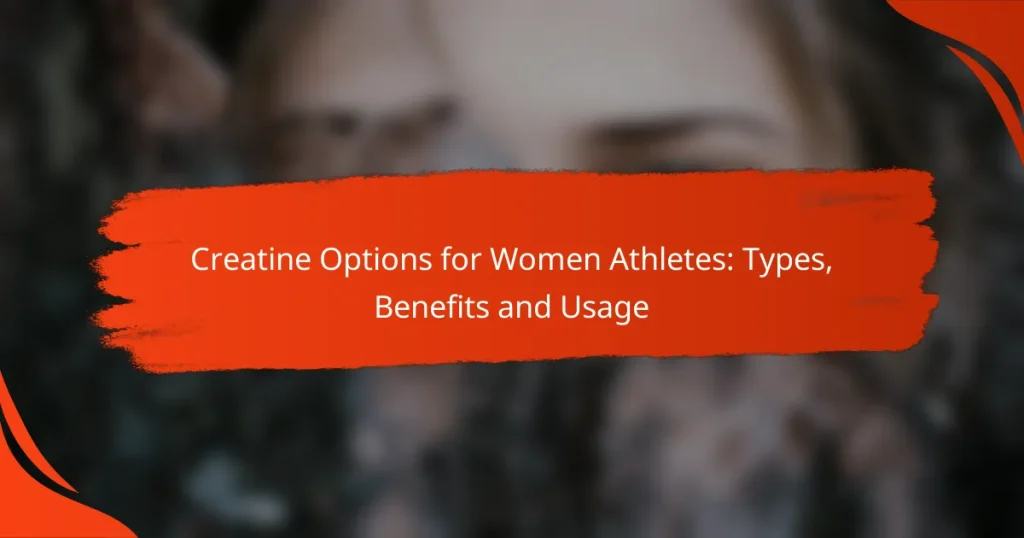Fitness supplements play a crucial role in enhancing the performance and well-being of active women. From protein powders to multivitamins, these products support muscle recovery, boost energy levels, and help meet nutritional needs. Choosing the right supplements involves considering ingredient transparency, dietary restrictions, and personal fitness goals to ensure they align with individual health objectives.
Post-Workout Recovery Supplements for Women: Top 5 Options
Protein Powders for Women: Plant-Based, Whey and Nutritional Benefits
Pre-Workout Supplements for Women: Safety and Efficacy Factors
Electrolyte Supplements for Women: Usage, Benefits and Hydration
Creatine Options for Women Athletes: Types, Benefits and Usage
Branched-Chain Amino Acids: Benefits, Dosage and Timing for Women
What are the best fitness supplements for active women?
The best fitness supplements for active women include protein powders, branched-chain amino acids (BCAAs), multivitamins, omega-3 fatty acids, and pre-workout supplements. These products can help enhance performance, support recovery, and ensure nutritional needs are met.
Protein powders
Protein powders are essential for muscle repair and growth, especially for active women. Common types include whey, casein, and plant-based options like pea or soy protein. Aim for a protein intake of about 1.2 to 2.0 grams per kilogram of body weight, depending on activity level.
When choosing a protein powder, look for one with minimal additives and a good amino acid profile. Check for third-party testing to ensure quality and safety.
Branched-chain amino acids (BCAAs)
BCAAs, which include leucine, isoleucine, and valine, are crucial for muscle recovery and reducing exercise-induced fatigue. They can be particularly beneficial during intense workouts or when training in a caloric deficit.
Consider taking BCAAs before or during workouts, with a typical dosage ranging from 5 to 10 grams. Look for products that contain a 2:1:1 ratio of leucine to isoleucine and valine for optimal benefits.
Multivitamins
Multivitamins can help fill nutritional gaps in an active woman’s diet, especially if dietary restrictions are present. Key vitamins and minerals to look for include vitamin D, calcium, iron, and B vitamins, which support energy metabolism and bone health.
Choose a multivitamin formulated for women, as these often contain the right balance of nutrients. Take it consistently to support overall health and wellness.
Omega-3 fatty acids
Omega-3 fatty acids are important for reducing inflammation and supporting heart health. They can be found in fatty fish, flaxseeds, and walnuts, but many women benefit from supplementation, especially if their diet lacks these sources.
A typical dosage is around 1,000 to 2,000 mg of combined EPA and DHA per day. Look for high-quality fish oil or algae-based supplements that are free from contaminants.
Pre-workout supplements
Pre-workout supplements are designed to enhance energy, focus, and endurance during workouts. Common ingredients include caffeine, beta-alanine, and citrulline malate, which can improve performance and delay fatigue.
When selecting a pre-workout, consider your caffeine tolerance and avoid excessive dosages. Start with a lower dose to assess your response, typically around 150 to 300 mg of caffeine per serving.
How do fitness supplements benefit active women?
Fitness supplements can significantly enhance the well-being and performance of active women by supporting muscle recovery, boosting energy levels, and improving overall athletic performance. These benefits can lead to more effective workouts and quicker recovery times, making it easier to maintain an active lifestyle.
Muscle recovery
Effective muscle recovery is crucial for active women, especially after intense workouts. Supplements like protein powders, branched-chain amino acids (BCAAs), and glutamine can help repair muscle tissue and reduce soreness. Aim for a protein intake of around 20-30 grams within 30 minutes post-exercise to maximize recovery benefits.
Additionally, hydration plays a key role in recovery. Consider electrolyte supplements if you engage in prolonged or high-intensity workouts, as they can help replenish lost minerals and support muscle function.
Improved energy levels
Fitness supplements can enhance energy levels, allowing active women to perform at their best. Ingredients like caffeine, B vitamins, and adaptogens such as ashwagandha can provide a natural energy boost. Caffeine, for instance, can improve endurance and focus, making it a popular choice before workouts.
It’s important to monitor your caffeine intake, aiming for a moderate dose of around 200-400 mg per day, depending on individual tolerance. Avoid excessive consumption, as it can lead to jitters and disrupt sleep patterns.
Enhanced performance
Supplements can also enhance athletic performance by increasing strength, endurance, and overall effectiveness during workouts. Creatine is a well-researched supplement that can improve strength and power output, making it beneficial for high-intensity training.
For endurance activities, consider beta-alanine, which can help delay fatigue and improve performance during prolonged exercise. Incorporating these supplements should be done with careful consideration of your specific fitness goals and dietary needs.
What should women consider when choosing fitness supplements?
Women should consider factors such as ingredient transparency, dietary restrictions, and personal fitness goals when selecting fitness supplements. These elements help ensure that the supplements align with their health needs and performance objectives.
Ingredient transparency
Ingredient transparency is crucial for women looking to choose effective fitness supplements. Always check labels for a complete list of ingredients and their sources. Supplements with clear, well-defined components are often more trustworthy and can help avoid unwanted additives or allergens.
Look for products that are third-party tested for quality and purity. Certifications from organizations like NSF International or Informed-Sport can provide additional assurance that the supplements meet safety and efficacy standards.
Dietary restrictions
Dietary restrictions play a significant role in supplement selection for women. Whether following a vegetarian, vegan, gluten-free, or other specific diet, it’s essential to choose supplements that align with these restrictions. Many products now cater to various dietary needs, so reading labels carefully is vital.
For instance, women who are lactose intolerant should avoid whey protein and opt for plant-based proteins instead. Additionally, those with allergies should be cautious of common allergens like soy, nuts, or shellfish, which can be present in some supplements.
Personal fitness goals
Personal fitness goals significantly influence the choice of supplements. Women aiming for weight loss may benefit from fat burners or meal replacement shakes, while those focused on muscle gain might look for protein powders or creatine. Identifying specific objectives helps narrow down the options effectively.
Consider consulting with a healthcare provider or a nutritionist to determine which supplements align best with individual fitness aspirations. This tailored approach can enhance performance and support overall health, ensuring that the chosen supplements contribute positively to the fitness journey.
How do fitness supplements support women’s health?
Fitness supplements can play a crucial role in supporting women’s health by addressing specific nutritional needs and enhancing overall well-being. They can help improve energy levels, hormonal balance, and recovery, making them valuable for active women.
Hormonal balance
Supplements such as omega-3 fatty acids, vitamin D, and magnesium can help maintain hormonal balance in women. These nutrients support the endocrine system, which regulates hormones that affect mood, metabolism, and reproductive health.
For instance, omega-3s may reduce symptoms of PMS and improve mood stability. Women should consider incorporating these supplements into their diet, especially during hormonal fluctuations, such as menstrual cycles or menopause.
Bone health
Bone health is essential for active women, and supplements like calcium and vitamin D are critical for maintaining bone density. These nutrients work together to enhance calcium absorption, reducing the risk of osteoporosis and fractures.
Women should aim for a daily intake of around 1,000 mg of calcium and 600-800 IU of vitamin D, especially if they are physically active. Regular weight-bearing exercises combined with these supplements can further strengthen bones.
Weight management
Fitness supplements can aid in weight management by boosting metabolism and promoting fat loss. Ingredients like green tea extract, protein powders, and fiber supplements can help control appetite and enhance fat oxidation.
For effective weight management, women might consider using protein supplements post-workout to support muscle recovery and satiety. Additionally, incorporating fiber can help maintain digestive health and prolong feelings of fullness, making it easier to manage weight effectively.
What are the top brands for women’s fitness supplements?
Several brands stand out for their quality and effectiveness in women’s fitness supplements. Notable names include Optimum Nutrition, Garden of Life, and BSN, each offering products tailored to support women’s health and fitness goals.
Optimum Nutrition
Optimum Nutrition is renowned for its high-quality protein powders and supplements designed for active women. Their Gold Standard Whey Protein is particularly popular, providing a convenient source of protein to support muscle recovery and growth.
When choosing Optimum Nutrition products, consider your specific fitness goals. For instance, if you’re looking to build muscle, a protein supplement with a higher protein content per serving may be beneficial. Additionally, their pre-workout formulas can enhance energy and focus during workouts.
Be mindful of ingredient labels and serving sizes. Some products may contain added sugars or artificial flavors, so opt for those with cleaner ingredient lists. Always check for third-party testing to ensure quality and safety, especially if you’re in a regulated market like the EU or the US.
